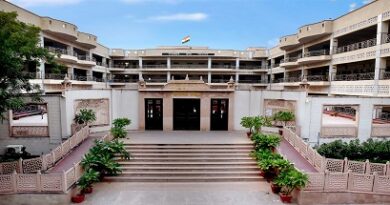Release Rohingya Refugees Detained in Jammu: Plea Filed In Supreme Court.
(Judicial Quest News Network)
A plea has been filed in Supreme Court seeking direction for release of the Rohingya refugees who have been detained in Jammu and to refrain the government from implanting any orders on deporting them.
The Application has been drawn by Advocate Cheryl Dsouza and filed through Advocate Prashant Bhushan
The plea also seeks UNHCR to intervene and determine the protection needs of the Rohingya refugees not just in the Jammu but also in camps across the country and complete the process of granting them Refugee cards.
These reliefs have been sought through an interim application in appending petition before the Supreme Court (WP (C) 739/2017.that was filed seeking protection of the Rohingya refugees from imminent danger of being deported and protection of the rights.
Through this interim application the petitioner requests to bring to the notice of this Hon’ble Court that even while this Hon’ble Court is seized of the matter, new circumstances have arisen.
News reports started coming in around the 7th of March 2021 regarding the nearly 150-170 Rohingya refugees in Jammu being detained.
This follows after the Union Minister Jitendra Singh’s statements two months ago that the Rohingya (identified as Muslim refugees by the government) wouldn’t be able to secure citizenship.
These refugees have been illegally detained and jailed in the Jammu Sub Jail which has been converted into a holding centre with the IGP (Jammu) Mukesh Singh stating that they face deportation back to Myanmar following verification by their embassy.
Disturbing reports from the Rohingya families have come in that subsequent to a biometric verification of Rohingya refugees undertaken by the Jammu and Kashmir administration, some people never returned to the camps from the verification but were detained and jailed by the Police.
This is despite the fact that most of the Rohingya refugees have cards issued by the UN High Commissioner for Refugees (UNHCR) acknowledging their status as refugees and granting them protections.
According to official documents from the office of deputy commissioner of Jammu, there are 6,523 Rohingya in Jammu.
It also submitted through the Application to release of the detained Rohingya refugees immediately and direction to the Union Territory government and Ministry of Home Affairs to expeditiously grant Refugee identification cards through the FRRO for the Rohingyas in the informal camps.
They have urged the court to direct the Union government to refrain from implementing any orders on deporting the Rohingya refugees who have been detained in the sub jail in Jammu.
This Hon’ble Court while hearing the present petition had observed that the Constitution is based on humanitarian values and hence a humanitarian approach should be taken on the matter.
The Hon’ble Court further observed that the state has a multi-pronged role – while national security and economic interests need to be secured, innocent women and children among the refugee population cannot be ignored.
The Hon’ble Court stated in its order dated 13th October 2017 that in case of any contingency during the pendency of this petition, the petitioner was free to approach the Hon’ble Court.
A report from The Hindu details how panic has gripped this already marginalized refugee community in Jammu after the verification drive and disappearance of family members.
The report states: 4 “The police are summoning our people [in Jammu]. Thirteen men who were asked to visit the police stations on Saturday have not returned,” Salamtullah, a Rohingya Muslim who escaped the genocide in Myanmar between 2016-17, said.
He said there were Rohingya families where the elders were rounded up and the kids were left behind. “I thank India for the hospitality and giving us the opportunity to earn our livelihood.
But the kids who are left behind after the latest drive are crying inconsolably. They should be allowed to meet their families,” he said.”
Recognition of refugees as distinct from migrants by India
In India, no legislation has been passed yet that specifically refers to refugees.
Hence, it has in practice often clubbed Rohingya refugees with the class of illegal immigrants who may be deported by the government under the Foreigners Act 1946 and the Foreigners Order 1948. This is coupled with discrimination against the Rohingya by the government, they being largely Muslim refugees.
Legally, however, a refugee is a special category of immigrant and cannot be clubbed with an illegal immigrant.
Under international law, a refugee is commonly defined as “any person who […] owing to well-founded fear of being persecuted for reasons of race, religion, nationality, membership of a particular social group or political opinion, is outside the country of his nationality and is unable or, owing to such fear, is unwilling to avail himself of the protection of that country; or who, not having a nationality and being outside the country of his former habitual residence as a result of such events, is unable or, owing to such fear, is unwilling to return to it.”
(UN General Assembly, Convention Relating to the Status of Refugees (28 July 1951).
This definition was first codified in Article 1(A)(2) of the 1951 Convention Relating to the Status of Refugees, and today is accepted to form part of customary international law.
Importantly, a person does not become a refugee because of recognition, but is recognised because he or she is a refugee.
As the determination of refugee status is merely declaratory, the principle of non-refoulement applies to those who have not yet had their status declared and are mere asylum-seekers, and even to those who have not expressed their wish to be protected.
In fact, the Indian government has in the past differentiated between illegal immigrants and refugees despite the absence of domestic legislation.
At no time has India acted to expel Tibetan refugees or to close their borders to new arrivals from Tibet.
Like Sri Lankan Tamils, the Indian government considers Tibetans in settlements and refugee camps throughout the country to be refugees. In fact, the government even issued special documentation to Tibetans and Sri Lankans, recognizing their status as refugees, and allowing them to access basic socio-economic rights.
The Indian government previously issued entering Tibetans with a Registration Certificate (RC).
This is a legal document issued pursuant to the Registration of Foreigners Act 1939 and SRO (Statutory Rules and Orders) 1108 of 1950 “Regulating Entry of Tibetan Nationals into India.” While not explicit in the terms of the order or on the face of the document itself, in practice, the RC serves as a de facto residence permit.
It entitles Tibetan refugees to rights similar to those of an Indian national, save for the right to vote or obtain employment in Indian government offices.
The Indian Express reports the anxiety of separated families after the sudden disappearance and detention of about 168 Rohingya refugees.
“When our parents did not return home yesterday, we cried and fell asleep without having food.
I still don’t know where they are or when they will return,’’ says Mohammad-ul-Hassan, 11. Looking on are his siblings Jaibullah (8), Noor Hassan (7) and Asma Jan (4).”
(A copy of The Indian Express report dated 8th March 2021, “After Rohingya held in Jammu, kids wait for parents, mother for son”,
The Application has stated that in India, no legislation has been passed yet that specifically refers to refuges, and therefore, it has practice often clubbed Rohingya refugees with the class of illegal immigrants who may be deported by the government under Foreigners Act 1946 and the Foreigners Order 1948.
This is coupled with discrimination against the Rohingya by the government, they being largely Muslim refugees.
Legally, however, a refugee is special category of immigration who may be deported by the government under Foreigners Act 1946 and the Foreigners Order 1948.
The Applicants submitted that India is bound to adhere to the principle of non-refoulment through customary international law.
India’s non-refoulment obligations under Article 21 of the Constitution of India and customary international law
The media reports quote Mr. Mukesh Singh, the Inspector General of Police, Jammu that deportation of Rohingya refugees from Jammu is imminent, goes against India’s commitment to refugee protection and its obligations against refouling refugees to a place where they face persecution and is a violation of the Article 21 rights of all Rohingya persons living in India.
India is bound to adhere to the principle of non-refoulement through customary international law.
The principle of non-refoulement – or not sending refugees to a place where they face danger – is a norm of customary international law. The content of the obligation has been explicitly expressed in Article 33(1) of the 1951 United Nations Convention on the Status of Refugees:
“No contracting State shall expel or return (“refouler”) a refugee in any manner whatsoever to the frontiers of territories where his life or freedom would be threatened on account of race, religion, nationality, membership of a particular social group or political opinion.
[emphasis added]
”
12. In order to become customary international law, a practice and obligation must be widely reflected in state practice and must be regarded by those states as a practice done out of obligation rather than courtesy (opiniojuris).
Besides, some norms of customary international law rise to the status of jus cogens norms – also called peremptory norms or non-derogable norms.
Such norms are not open to appeal or challenge, but are so axiomatic to civilized international order that they are deemed final. Clearly, the principle of non-refoulement is just cogens norms of international customary law.
Therefore, to the extent that ‘national security’ exceptions exist, they must be limited and carefully applied. Any ‘national security’ exception must be rigorously and carefully proved.
The term cannot become a ‘catch-all’ into which everything falls, because that would extinguish the substance of the right.
The Hon’ble Court must therefore take exceptional care in evaluating whether measures purported in the interests of ‘national security’ are in fact on that basis. Moreover, the Hon’ble Court must recognise that mass refoulement without due process is arbitrary.



